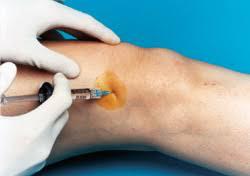Viscosupplementation for Osteoarthritis of the Knee

Osteoarthritis of the knee is a very common cause of disability. Not only does it cause pain, but also causes difficulty in activities of daily living. Activities like walking, climbing stairs, squatting, kneeling becomes progressively difficult.
For more information about osteoarthritis http://www.shoulderkneesurgery.com/knee-arthritis/
Treatment options for arthritis in the initial stages include pain medications, physiotherapy, activity modification and weight loss.
surgical treatment can be the only option if none of these measures work. Total knee replacement surgery http://www.shoulderkneesurgery.com/total-knee-replacement/ has been a very successful operation in its ability to relieve pain and restore motion.
However, there are multiple patients who are either reluctant to, or medically unfit to undergo surgery. At times there are patients with severe arthritis, who are very young in whom knee replacement may not be indicated as yet.
Viscosupplementation may be a treatment option for such individuals.
In this procedure, a gel-like fluid called hyaluronic acid is injected into the knee joint. Hyaluronic acid is a naturally occurring substance found in the synovial fluid surrounding joints. It acts as a lubricant to enable bones to move smoothly over each other and as a shock absorber for joint loads. People with osteoarthritis have a lower-than-normal concentration of hyaluronic acid in their joints. Injecting hyaluronic acid to the arthritic joint is claimed to facilitate movement and reduce pain.Several preparations of hyaluronic acid are now commercially available.
Procedure:
Viscosupplementation is most of the times an out patient procedure, which takes a few minutes. It does not involve inpatient admission. Most of the preparations that are currently available need only a single injection. A local anaesthetic may be injected before the procedure.
After the procedure:
You are allowed to perform your daily routine as soon as the procedure is over, however your surgeon may advise you against excess weight bearing, heavy lifting, running and jumping for a few days. Ice packs may help relieve local warmth and pain from the injection.
How long will the effect last?
Reduction in pain and duration of action is variable. It is expected to last for six months, but there are patients who report significant pain relief for up to 18 months. There is an option to repeat the injection if there is recurrence of pain after a period of significant pain relief.
Viscosupplementation is an option that can be considered when all the other conservative measures fail to achieve adequate pain relief. The intent of the procedure is relief from pain, but not to regrow the damages cartilage. Even though it is a temporary measure, it can be an effective solution for a patient who is too young or has decided against surgery. It can be an effective solution for patients in whom surgery is contraindicated due to medical reasons.

